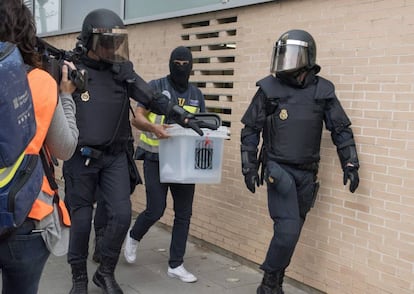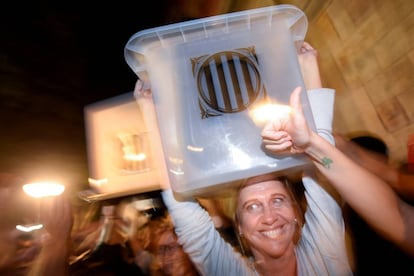Solved: the mystery of the missing Catalan ballot boxes
Hundreds of activists concealed them inside private homes, schools and churches across the region

The mystery of the Catalan ballot boxes was solved on Sunday. Finding them before the banned referendum could take place had been a top priority for the National Police and the Civil Guard, but they were unable to locate them in time.
Despite theories that they might have been sent to another country for safekeeping, the Chinese-made boxes had been in Catalonia all along.
Pro-independence activists involved in organizing the referendum – which had been suspended by the courts on grounds of unconstitutionality – shared out the tasks and decided, as a safety precaution, that nobody would know what the other organizers were doing.
This has been a disaster from the point of view of information and intelligence
National Police official
People hid the ballot boxes inside their own homes, in schools, in town halls and even inside churches. In the early hours of Sunday, they began taking them out of their hiding places. The boxes began arriving at the polling stations in the trunks of regular citizens’ cars, wrapped in garbage bags.
Of the approximately 10,000 boxes ordered from Chinese company Smart Dragon Ballot Expert through the e-commerce website Alibaba, the Spanish police were only able to confiscate four before polling opened on Sunday – inside a vehicle on its way to a school in Barcelona.
By comparison, law enforcement officers had previously managed to seize over 12 million ballot papers and millions of envelopes, besides other voting material. But the Catalan government promised that the vote would take place regardless.

For weeks, the National Police, the Civil Guard and the Spanish intelligence services had been working with several theories. One hypothesis posited that the ballot boxes might be in a Baltic state, or in the principality of Andorra, or in southern France. Police sources said they had been confident that they would intercept the boxes at the border, sometime before October 1.
Sources familiar with the investigation conceded that they felt frustrated at their inability to locate the boxes in time to confiscate them, particularly since the equipment had been in Catalonia the entire time.
Officials at schools that were used as polling stations told EL PAÍS that some activists bought boxes directly on Alibaba, while others picked them up at the port, where they arrived inside containers.
For safety reasons, and to avoid leaks, tasks were shared out so that nobody knew who was doing what
Activist
“We’ve been organizing ourselves in committees for months,” explained sources in Barberá del Vallés (Barcelona). “There were logistics committees, polling station committees and volunteer committees, around 50 people per group. We needed 38 boxes for our four polling centers: two high schools and two health centers.”
“For safety reasons, and to avoid leaks, tasks were shared out so that nobody knew who was doing what, but everyone did one thing, and it worked out really well. Both separatists and non-separatists have voted here,” said an activist at one of those schools.
The only people who knew where the boxes were were the people in charge of their custody.
“I got a call one day and was told: you have to be in such a place at such a time to pick up a parcel and keep it for X days, and then somebody else will take it from you, and that’s it.”
Help from the Church
The parish church of Sant Pere de Figueres (Girona) doubled as a polling station on Sunday, as did the Church of Sant Feliu del Valle de Boí (Lleida). At the Jesuit-run school Infant Jesús in Barcelona, where former Catalan premier Artur Mas went to cast his ballot, school officials helped keep the doors shut when the National Police showed up to evacuate the premises and seal off the building. Around 20 Christian schools across Catalonia were used as polling stations, according to the online daily Catalunya Religió.
The ballot boxes were thus strategically scattered across the region, thanks to a highly-organized group of civilians who managed to fool the country’s law enforcement agencies.
“This has been a disaster from the point of view of information and intelligence,” admitted National Police officials, speaking privately.
In some cases, the boxes were concealed inside churches. This was the case with the ballot boxes used inside the Sant Julià de Ramis pavilion in Girona, where Catalan premier Carles Puigdemont was supposed to vote (the police intervened to seal off this polling station.)
English version by Susana Urra.
Tu suscripción se está usando en otro dispositivo
¿Quieres añadir otro usuario a tu suscripción?
Si continúas leyendo en este dispositivo, no se podrá leer en el otro.
FlechaTu suscripción se está usando en otro dispositivo y solo puedes acceder a EL PAÍS desde un dispositivo a la vez.
Si quieres compartir tu cuenta, cambia tu suscripción a la modalidad Premium, así podrás añadir otro usuario. Cada uno accederá con su propia cuenta de email, lo que os permitirá personalizar vuestra experiencia en EL PAÍS.
¿Tienes una suscripción de empresa? Accede aquí para contratar más cuentas.
En el caso de no saber quién está usando tu cuenta, te recomendamos cambiar tu contraseña aquí.
Si decides continuar compartiendo tu cuenta, este mensaje se mostrará en tu dispositivo y en el de la otra persona que está usando tu cuenta de forma indefinida, afectando a tu experiencia de lectura. Puedes consultar aquí los términos y condiciones de la suscripción digital.








































